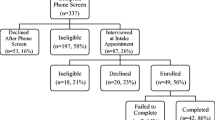Abstract
Objectives
One core assumption of mindfulness interventions is that engagement via session attendance and at-home mindfulness practices is essential to the program’s efficacy. In two samples of pregnant women who underwent Mindfulness-Based Cognitive Therapy for Perinatal Depression (MBCT-PD), we aimed to evaluate predictors of engagement as well as associations between engagement and clinical outcomes.
Methods
Pregnant adult women with depression histories received MBCT-PD in an open trial (N = 49) or a pilot randomized clinical trial (N = 43). Engagement was measured by quantity of at-home practice and class attendance. Clinical outcomes were self-reported depressive symptoms measured at post-intervention and at 6-months postpartum. Potential predictors of engagement included baseline demographic and clinical characteristics.
Results
On average, women reported engaging in formal mindfulness practice 3.35 (SD = 1.86) times per week for 13.95 (SD = 7.25) minutes per session. Greater engagement was significantly associated with decreased depressive symptoms at post-intervention and 6 months postpartum, with medium to large effect sizes. The number of children was negatively associated with attendance and occasions of practice, with medium to large effect sizes, although not statistically significant. Prior depressive episodes, age, income, and education were not associated with engagement variables.
Conclusions
Engagement is associated with improvements in mothers’ mental health following MBCT-PD. Given the association between mothers’ depression and their parenting behavior, MBCT-PD may be a useful intervention for enhancing parenting skills.
Similar content being viewed by others
References
Campbell, S. B., Cohn, J. F., & Meyers, T. (1995). Depression in first-time mothers: Mother-infant interaction and depression chronicity. Developmental Psychology, 31(3), 349–357. https://doi.org/10.1037/0012-1649.31.3.349.
Carmody, J., & Baer, R. A. (2008). Relationships between mindfulness practice and levels of mindfulness, medical and psychological symptoms and well-being in a mindfulness-based stress reduction program. Journal of Behavioral Medicine, 31, 23–33. https://doi.org/10.1007/s10865-007-9130-7.
Coffman, S. J., Dimidjian, S., & Baer, R. A. (2006). Mindfulness-based cognitive therapy for prevention of depressive relapse. In R. A. Baer & R. A. Baer (Eds.), Mindfulness-based treatment approaches: Clinician’s guide to evidence base and applications. (pp. 31–50). San Diego, CA, US: Elsevier Academic Press. doi: https://doi.org/10.1016/B978-012088519-0/50003-4
Cox, J. L., Holden, J. M., & Sagovsky, R. (1987). Detection of postnatal depression: Development of the 10-item Edinburgh Postnatal Depression Scale. The British Journal of Psychiatry, 150, 782–786. https://doi.org/10.1192/bjp.150.6.782.
Crane, C., Crane, R. S., Eames, C., Fennell, M. J. V., Silverton, S., Williams, J. M. G., & Barnhofer, T. (2014). The effects of amount of home meditation practice in mindfulness based cognitive therapy on hazard of relapse to depression in the Staying Well after Depression Trial. Behaviour Research and Therapy, 63, 17–24. https://doi.org/10.1016/j.brat.2014.08.015.
del Re, A. C., Flückiger, C., Goldberg, S. B., & Hoyt, W. T. (2013). Monitoring mindfulness practice quality: An important consideration in mindfulness practice. Psychotherapy Research, 23(1), 54–66. https://doi.org/10.1080/10503307.2012.729275.
Dimidjian, S., Goodman, S. H., Felder, J. N., Gallop, R., Brown, A. P., & Beck, A. (2015). An open trial of mindfulness-based cognitive therapy for the prevention of perinatal depressive relapse/recurrence. Archives of Women's Mental Health, 18(1), 85–94. https://doi.org/10.1007/s00737-014-0468-x.
Dimidjian, S., Goodman, S. H., Felder, J. N., Gallop, R., Brown, A. P., & Beck, A. (2016). Staying well during pregnancy and the postpartum: A pilot randomized trial of mindfulness-based cognitive therapy for the prevention of depressive relapse/recurrence. Journal of Consulting and Clinical Psychology, 84(2), 134–145. https://doi.org/10.1037/ccp0000068.
Dimidjian, S., & Segal, Z. V. (2015). Prospects for a clinical science of mindfulness-based intervention. American Psychologist, 70(7), 593–620. https://doi.org/10.1037/a0039589.
First, M. B., Spitzer, R. L., Gibbon, M., & Williams, J. B. W. (1994). Structured clinical interview for axis I DSM-IV disorders—patient edition. Washington, DC: American Psychiatric Press.
Goodman, S. H., Rouse, M. H., Connell, A. M., Broth, M. R., Hall, C. M., & Heyward, D. (2011). Maternal depression and child psychopathology: A meta-analytic review. Clinical Child and Family Psychology Review, 14(1), 1–27. https://doi.org/10.1007/s10567-010-0080-1.
Hawley, L. L., Schwartz, D., Bieling, P. J., Irving, J., Corcoran, K., Farb, N. A. S., & Segal, Z. V. (2014). Mindfulness practice, rumination and clinical outcome in mindfulness-based treatment. Cognitive Therapy and Research, 38(1), 1–9. https://doi.org/10.1007/s10608-013-9586-4.
Keller, M. B., Lavori, P. W., Friedman, B., Nielsen, E., Endicott, J., McDonald-Scott, P., & Andreasen, N. C. (1987). The longitudinal interval follow-up evaluation: A comprehensive method for assessing outcome in prospective longitudinal studies. Archives of General Psychiatry, 44(6), 540–548. https://doi.org/10.1001/archpsyc.1987.01800180050009.
Kuyken, W., Warren, F. C., Taylor, R. S., Whalley, B., Crane, C., Bondolfi, G., et al. (2016). Efficacy of mindfulness-based cognitive therapy in prevention of depressive relapse: An individual patient data meta-analysis from randomized trials. JAMA Psychiatry, 73(6), 565–574. https://doi.org/10.1001/jamapsychiatry.2016.0076.
Lovejoy, M. C., Graczyk, P. A., O’Hare, E., & Neuman, G. (2000). Maternal depression and parenting behavior: A meta-analytic review. Clinical Psychology Review, 20(5), 561–592. https://doi.org/10.1016/S0272-7358(98)00100-7.
Parsons, C. E., Crane, C., Parsons, L. J., Fjorback, L. O., & Kuyken, W. (2017). Home practice in mindfulness-based cognitive therapy and mindfulness-based stress reduction: A systematic review and meta-analysis of participants’ mindfulness practice and its association with outcomes. Behaviour Research and Therapy, 95, 29–41. https://doi.org/10.1016/j.brat.2017.05.004.
Perich, T., Manicavasagar, V., Mitchell, P. B., & Ball, J. R. (2013). The association between meditation practice and treatment outcome in Mindfulness-based cognitive therapy for bipolar disorder. Behaviour Research and Therapy, 51(7), 338–343. https://doi.org/10.1016/j.brat.2013.03.006.
Potharst, E. S., Aktar, E., Rexwinkel, M., Rigterink, M., & Bögels, S. M. (2017). Mindful with your baby: Feasibility, acceptability, and effects of a mindful parenting group training for mothers and their babies in a mental health context. Mindfulness, 8, 1236–1250. https://doi.org/10.1007/s12671-017-0699-9.
Stanley, E. A., Schaldach, J. M., Kiyonaga, A., & Jha, A. P. (2011). Mindfulness-based mind fitness training: A case study of a high-stress predeployment military cohort. Cognitive and Behavioral Practice, 18(4), 566–576. https://doi.org/10.1016/j.cbpra.2010.08.002.
Vettese, L. C., Toneatto, T., Stea, J. N., Nguyen, L., & Wang, J. J. (2009). Do mindfulness meditation participants do their homework? And does it make a difference? A review of the empirical evidence. Journal of Cognitive Psychotherapy, 23(3), 198–225. https://doi.org/10.1891/0889-8391.23.3.198.
Acknowledgments
We wish to thank all the study team members who contributed to the completion of this research, including our key collaborators at KP (Thomas B. Landry, Deborah Hoerter, Fonda Mitchell, and Carolee Nimmer), study therapists (Amy Brooks-DeWeese, Robbin Ryan, and Joanne Whalen), research coordinators (Amanda Whittaker, Courtney Timms, Allen Mallory, Christina Metcalf, Abigail Lindemann, Abigail Lockhart, and Jennifer Boggs), assessors (Debra Boeldt, Christopher Hawkey, Cara Lusby, Meaghan McCallum, Matthew Rouse, and Courtney Stevens), and research assistants (Tess Atteberry, Kathryn Breazeale, Lucas Bermudez, Michaela Cuneo, Elizabeth Eustis, Anna Frye, Dhwani Kothari, Nicholas Webb, Jennalee Wooldridge, Nassim Zanganeh, and Capella Zhuang). We would like to express special appreciation for Sharon Salzberg, who collaborated on the writing and recording of the meditation instructions; Nancy Bardacke, who contributed consultation and the “Being With Baby” meditation practice; De West, who recorded the yoga DVD; and Zindel Segal. We also express our gratitude to the members of our Data Safety and Monitoring Board who contributed time and expertise to the oversight of the study.
Funding
We acknowledge the funding by the National Institute of Mental Health (R34MH083866).
Author information
Authors and Affiliations
Contributions
APBE conceptualized research questions, completed data analyses, and wrote the manuscript. SHG and SD designed the study, planned and executed data collection, and assisted with conceptualizing the research questions, interpretation of findings, and writing the manuscript. RG completed power analyses, contributed to analyses and interpretation, and wrote part of the results.
Corresponding author
Ethics declarations
Conflict of Interest
Sona Dimidjian and Sherryl H. Goodman receive royalties from Guilford Press for work related to mindfulness-based cognitive therapy, and Sona Dimidjian was on the advisory board of MindfulNoggin, which was part of NogginLabs, a private company specializing in customized web-based learning.
Ethical Approval
All procedures performed in studies involving human participants were in accordance with the ethical standards of Kaiser-Permanente-Colorado, Kaiser-Permanente-Georgia, the University of Colorado Boulder and Emory University institutional review boards (IRBs) and with the 1964 Helsinki declaration and its later amendments or comparable ethical standards.
Informed Consent Statement
Informed consent was obtained from all individual participants.
Additional information
Publisher’s Note
Springer Nature remains neutral with regard to jurisdictional claims in published maps and institutional affiliations.
Rights and permissions
About this article
Cite this article
Evans, A.P.B., Goodman, S.H., Dimidjian, S. et al. The Role of Engagement in Mindfulness-Based Cognitive Therapy for the Prevention of Depressive Relapse/Recurrence in Perinatal Women. Mindfulness 12, 61–67 (2021). https://doi.org/10.1007/s12671-019-01160-4
Published:
Issue Date:
DOI: https://doi.org/10.1007/s12671-019-01160-4




